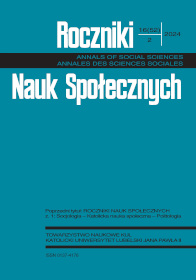Fertility Level and the Popularity of Solutions Supporting the Work-Family Life Balance in Poland
Fertility Level and the Popularity of Solutions Supporting the Work-Family Life Balance in Poland
Author(s): Marta Luty-MichalakSubject(s): Social Sciences, Sociology, Family and social welfare
Published by: Towarzystwo Naukowe KUL & Katolicki Uniwersytet Lubelski Jana Pawła II
Keywords: family policy; fertility; work-life balance; flexible working time; institutional care for children under 3
Summary/Abstract: The narrowing replacement of generations observed in Poland over recent decades has many causes. A conflict between work and family lives is identified as one of them. There are a number of solutions in Polish family policy aimed at mitigating this conflict. This article analyses the level of fertility in Poland since 1990 as well the popularity of solutions that make working time more flexible and social services in the field of institutional childcare for children up to three years of age. Data from the following databases were used during the analysis: Eurostat database, OECD: Human Fertility Database and Eurofound: European Working Conditions Survey. Flexible working time solutions enjoy similar popularity in Poland as in other EU countries. The exception, for financial reasons, is part-time work. The analysis also indicates poor accessibility to institutional childcare.
Journal: Roczniki Nauk Społecznych
- Issue Year: 52/2024
- Issue No: 2
- Page Range: 45-62
- Page Count: 18
- Language: English

